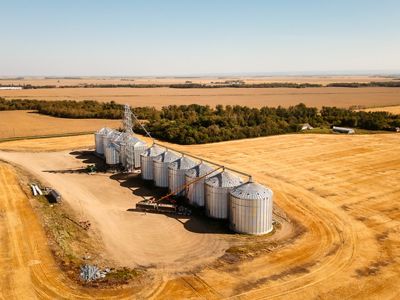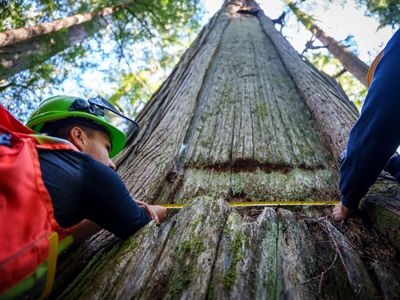
New Research Shows that Canada Is Missing a Key Economic Asset: Nature
RBC and Nature United reveal how valuing natural capital — Canada’s forests, wetlands and waters — can support prosperity and resilience.
Forests, farmlands and waters do more than sustain wildlife and regulate climate — they support livelihoods, strengthen communities and contribute to Canada’s resilience and prosperity. Yet, new research reveals that these natural assets are being left off Canada’s economic balance sheet. The result: missed opportunities to build resilient rural economies, unlock new sources of prosperity, and ensure a thriving future for people and nature.
The report, Unearthing Value: How nature can play a critical role in pro-growth agendas , shows that nature-based sectors — such as agriculture, forestry and fisheries — have grown 0.3% slower year-over-year than the rest of Canada’s economy over the past 25 years. This is not due to a lack of potential, but rather not recognizing and investing in nature as a foundational economic asset. Led by the RBC Climate Action Institute, with Nature United as a key research partner contributing expertise, case studies, and critical review, the report underscores the need to reframe nature as central to Canada’s economic future.
“Building and accounting natural capital is a wealth building opportunity” says Lisa Ashton, Director of Agriculture Policy at RBC Climate Action Institute. “It’s an opportunity to treat nature not as a cost to manage but as an asset to build, value and leverage. Nations that do so can shift control and value of natural wealth to those who steward it.”
“Nature is not just a backdrop to our economy — it’s a driver of innovation and opportunity, and a way to manage risk,” says Jane Church, Nature United’s Director of Strategic Partnerships. “By recognizing natural capital as essential infrastructure, we can unlock new markets, support Indigenous leadership and build a more inclusive and resilient economy for all Canadians.”
Canada is not alone in facing this challenge. RBC’s research compares Canada’s approach to those of the United States and the United Kingdom, highlighting different models for integrating nature into economic growth through real-world case studies.




Financing Nature’s Future
One of the report’s key findings is that governments provide 82% of global nature finance, while the private sector’s potential to drive innovation and environmental, economic and social benefits remains largely untapped. To scale nature-positive business models, Canada must create conditions that mobilize private investment.
Farmers in southern Manitoba are proving that water stewardship can boost profitability, through a project led by a collective of Prairie-based organizations, agri-businesses, and four farms spanning over 45,000 acres. Farmers generated, on average, $6,900 per acre of value for the public through ecosystem services such as pollination habitat, soil health, and water regulation. The value returned to farmers, based on carbon market values in the region, was $33 per acre.
This case study shows that aligning public and private incentives — and empowering farmers with data — can produce durable outcomes for nature, communities, and the economy.

Nature in the Marketplace
Beyond finance, the report explores how market mechanisms can elevate nature’s role in the economy. Nature-based offsets, biodiversity credits and green premiums create markets that reward stewardship and sustainable practices. Yet, nature-focused projects still account for less than 10% of proceeds from green, social and sustainability bonds.
Farmers, forest managers, and fishers — whose livelihoods depend on nature — are often excluded from these markets. Community Forest Agreements in British Columbia offer a promising exception. By enabling local and Indigenous communities to manage forests under long-term tenures, projects such as the Cheakamus Community Forest have generated more than 150,000 carbon credits and diversified revenue streams — demonstrating how inclusive, place-based models can unlock nature’s economic value.
Quote: Jane Church
Business leaders have a vital role in unlocking Canada’s Nature Advantage. More than environmental responsibility, nature-based solutions are a smart investment in long-term value for people, the planet and the economy.
A Path Forward
To realize the full potential of nature in Canada’s economy, the report highlights these foundational steps: integrating nature accounting into GDP assessments and infrastructure planning; building market and data infrastructure to support the valuation of nature; expanding incentives for clean growth and Indigenous equity in land-based productive sectors; and embedding policy integration across sectors to support nature-based infrastructure. These shifts are essential to ensure that nature is not just protected but valued in ways that can drive innovation, resilience and growth.
By recognizing nature as an asset, Canada can help farmers, foresters and Indigenous businesses access new markets, create new opportunities in rural and Indigenous communities, and deliver long-term value for both people and the planet. This approach reflects a growing consensus among leaders in finance, agriculture, forest management, and Indigenous business that nature is a smart business investment. This vision is being advanced through Canada’s Nature Advantage, a network committed to spotlighting business models and policy solutions that reward stewardship and scale investment in nature.
“Business leaders have a vital role in unlocking Canada’s Nature Advantage,” says Church from Nature United. “More than environmental responsibility, nature-based solutions are a smart investment in long-term value for people, the planet and the economy.”
Realizing Canada’s Nature Advantage requires more than policy reform; it calls for a shift in how we value and invest in nature. By embedding nature into economic growth, Canada can lead a new era of prosperity that is inclusive, resilient and regenerative. The time to act is now — because, as the report concludes, “the wealth beneath our wealth” is waiting to be unearthed.
Nature United was founded as a Canadian charity in 2014, building on decades of conservation in Canada. Headquartered in Toronto, our organization has field staff located across the country. Nature United supports Indigenous leadership, sustainable economic development and science and large-scale conservation, primarily in British Columbia, the Northwest Territories and Manitoba. Our organization is also working to accelerate Natural Climate Solutions at national and regional scales. To learn more, visit natureunited.ca or follow us on Linkedin, Instagram and Facebook.
We are the Canadian affiliate of The Nature Conservancy, a global conservation organization with more than a million members and a diverse team that includes more than 400 scientists. Our global organization works in more than 80 countries and territories — either directly or through partnerships — to conserve the lands and waters on which all life depends. To learn more, visit www.nature.org or follow @nature_press.